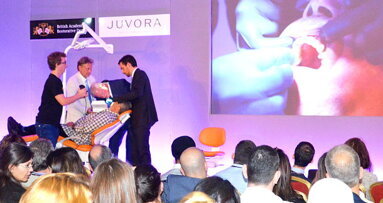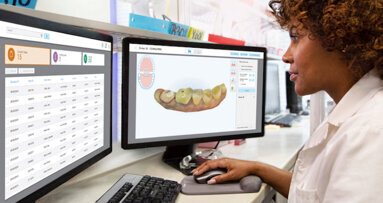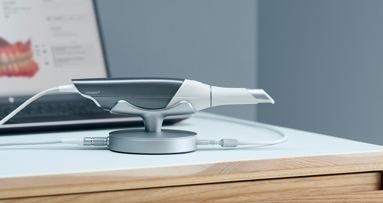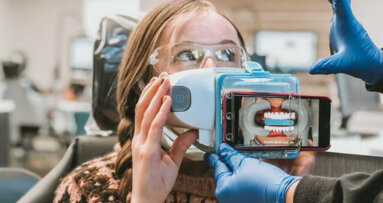A behaviourally driven bacterial disease, dental caries is one of the most prevalent primarily preventable conditions in the world. Even in developed countries with water fluoridation and ready access to fluoridated toothpaste, a large proportion of children still have experience of advanced dental caries. In the past 50 years, the prevention of dental caries has focused mainly on the delivery of fluoride, whether it be via reticulated water, toothpaste or professionally delivered products, such as varnishes and gels.
A sound knowledge of the causative factors of dental caries, however, is important in the process of developing a holistic preventative programme for the individual. Demineralisation occurs when the fluid at the surface of the tooth becomes undersaturated with respect to tooth mineral. This is normally due to a decrease in pH below the often-stated critical pH of around 5.6. The critical pH is not a constant, but relates to the amount of calcium and phosphate present, as well as the pH. The microbiome of the dental biofilm develops after birth, and is influenced significantly by the ingestion of fermentable carbohydrates, especially sucrose and fructose. The production of organic acids from the metabolism of sugars decreases the pH in the biofilm, creating an amphibiotic change to an aciduric and acidogenic microbiota, also known as Marsh’s ecological shift. Dietary change to infrequent ingestion of sugary foods and drinks therefore is the first step in prevention of dental caries.
In addition to dietary control, fluoride is still considered the gold standard for caries prevention. However, the action of fluoride, especially for remineralisation, is limited by the concentration of bioavailable calcium and phosphate in the local environment (biofilm fluid). Remineralisation is only possible in the presence of bioavailable calcium and phosphate, with the intrinsic source being saliva, a limited resource. Recently, several products containing calcium and phosphate have been developed and are available commercially.
While a number of claims of efficacy have been made, the evidence for many is still limited. For example, casein phosphopeptide-amorphous calcium phosphate (CPP-ACP) is a milk-derived product that utilises a peptide to stabilise calcium and phosphate in a bioavailable state—reacting to acidity and saturation with respect to tooth mineral. Incorporation of CPP-ACP into products such as a topical crème can provide high concentrations of calcium and phosphate ions that can diffuse into demineralised tooth structure down a concentration gradient. This remineralisation is enhanced by the presence of fluoride ions.
The inhibition of demineralisation and subsequent remineralisation of early carious lesions (white spot lesions) is sometimes considered unlikely owing to an inability of the patient to reduce risk factors, such as a sugary diet, poor oral hygiene habits, including interdental cleaning, as well as poor salivary flow and possibly developmental defects of enamel. In these instances, the use of sealing or infiltrating agents, such as fissure sealants or resin infiltrate, can be effective, although remineralisation of the treated area may not be possible afterwards. These products either seal the surface of the lesion or infiltrate the porosity of the lesion to decrease the loss of mineral from the tooth, and can prevent the lesion progressing to cavitation.
The prevention of dental caries is far more than just fluoride. A sound knowledge of the caries process assists the clinician in formulating an individualised preventative programme for patients.
This afternoon, Prof. Manton is presenting a paper titled “The prevention of dental caries—It is a lot more than fluoride” as part of this year’s World Dental Congress programme in Madrid.
Not only a dental event that the whole team will enjoy but also the perfect opportunity to gain valuable education and experience, The Dentistry Show, ...
LONDON, UK. It has been another busing three days for BA International at the BDIA Dental Showcase in London. For years, the Northampton company has been ...
The 2016 British Academy of Restorative Dentistry (BARD) Conference was held at the Forest of Arden Marriott Hotel and Country Club in Meriden on 3 and 4 ...
LONDON, UK: During the COVID-19 pandemic, Align Technology worked with a number of key opinion leaders with a view to exploring best practice strategies for...
COPENHAGEN, Denmark: TRIOS 3 is a trusted, award-winning tool embraced by tens of thousands of dentists worldwide. This artificial intelligence-powered ...
The greater and more flexible use of skills mix is steadily becoming one of the most efficient and effective ways of improving treatment outcomes in the ...
Dr Bhavna Doshi is a dental practitioner and CEO of Dental Wealth Builder (DWB) which primarily focuses on strategies for practice profitability and growth....
LEEDS, UK: Though dental fillings are an established method of treating the presence of dental caries in permanent dentition, their usefulness for treating ...
Sex trafficking remains a major issue in many parts of Asia, not only in sex tourism hot spots like in Indonesia or Thailand but also in smaller countries ...
LONDON, UK: The General Dental Council (GDC) has welcomed innovation in dentistry, including where treatment and consultations occur remotely, but has ...
Dental practices are increasingly turning to latest technology, not only to manage bookings and prompt repeat appointments and create more positive patient ...
Live webinar
Tue. 24 February 2026
6:00 pm UTC (London)
Prof. Dr. Markus B. Hürzeler
Live webinar
Tue. 24 February 2026
8:00 pm UTC (London)
Prof. Dr. Marcel A. Wainwright DDS, PhD
Live webinar
Wed. 25 February 2026
4:00 pm UTC (London)
Prof. Dr. Daniel Edelhoff
Live webinar
Wed. 25 February 2026
6:00 pm UTC (London)
Live webinar
Thu. 26 February 2026
1:00 am UTC (London)
Live webinar
Tue. 3 March 2026
4:00 pm UTC (London)
Dr. Omar Lugo Cirujano Maxilofacial
Live webinar
Wed. 4 March 2026
1:00 am UTC (London)
Dr. Vasiliki Maseli DDS, MS, EdM



 Austria / Österreich
Austria / Österreich
 Bosnia and Herzegovina / Босна и Херцеговина
Bosnia and Herzegovina / Босна и Херцеговина
 Bulgaria / България
Bulgaria / България
 Croatia / Hrvatska
Croatia / Hrvatska
 Czech Republic & Slovakia / Česká republika & Slovensko
Czech Republic & Slovakia / Česká republika & Slovensko
 France / France
France / France
 Germany / Deutschland
Germany / Deutschland
 Greece / ΕΛΛΑΔΑ
Greece / ΕΛΛΑΔΑ
 Hungary / Hungary
Hungary / Hungary
 Italy / Italia
Italy / Italia
 Netherlands / Nederland
Netherlands / Nederland
 Nordic / Nordic
Nordic / Nordic
 Poland / Polska
Poland / Polska
 Portugal / Portugal
Portugal / Portugal
 Romania & Moldova / România & Moldova
Romania & Moldova / România & Moldova
 Slovenia / Slovenija
Slovenia / Slovenija
 Serbia & Montenegro / Србија и Црна Гора
Serbia & Montenegro / Србија и Црна Гора
 Spain / España
Spain / España
 Switzerland / Schweiz
Switzerland / Schweiz
 Turkey / Türkiye
Turkey / Türkiye
 UK & Ireland / UK & Ireland
UK & Ireland / UK & Ireland
 International / International
International / International
 Brazil / Brasil
Brazil / Brasil
 Canada / Canada
Canada / Canada
 Latin America / Latinoamérica
Latin America / Latinoamérica
 USA / USA
USA / USA
 China / 中国
China / 中国
 India / भारत गणराज्य
India / भारत गणराज्य
 Pakistan / Pākistān
Pakistan / Pākistān
 Vietnam / Việt Nam
Vietnam / Việt Nam
 ASEAN / ASEAN
ASEAN / ASEAN
 Israel / מְדִינַת יִשְׂרָאֵל
Israel / מְדִינַת יִשְׂרָאֵל
 Algeria, Morocco & Tunisia / الجزائر والمغرب وتونس
Algeria, Morocco & Tunisia / الجزائر والمغرب وتونس
 Middle East / Middle East
Middle East / Middle East



















































To post a reply please login or register